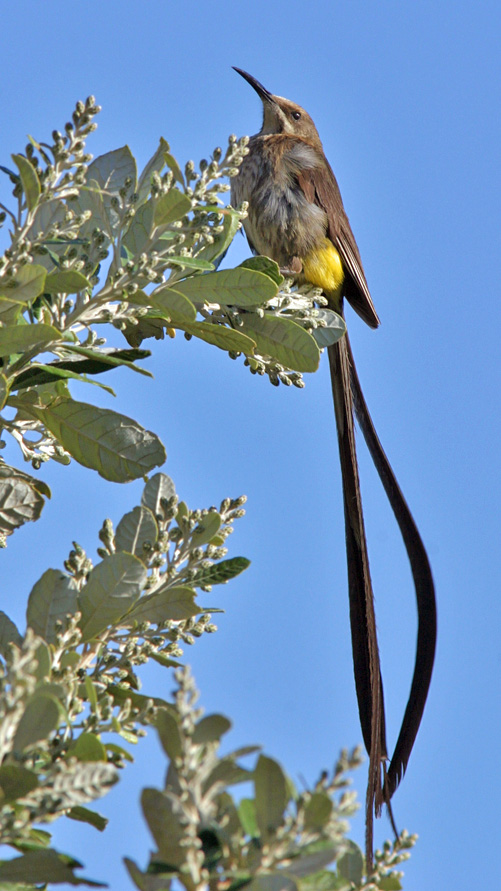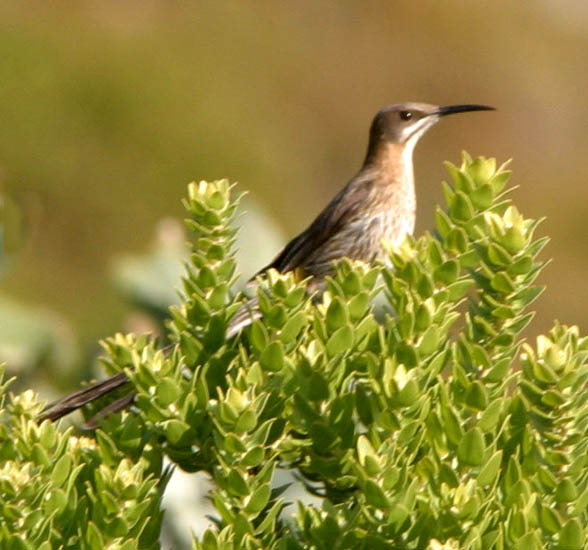| |
SUGARBIRDS Promeropidae |
- 2 species in southern Africa
- DR personal total: 1 species (50%), 1 photo'd
|

The Sugarbirds are a small family of African passerines. These are just two species of sugarbirds (genus Promerops) endemic to southern Africa.
Perhaps the best known is Cape Sugarbird
(male [left] and female [below]). Males have dramatically long tails
that blow in the breeze; females also have long tails but nothing like
the very long tails of males. They have brush-tipped tongues to consume
nectar, and overall they resemble a very large and long-tailed sunbird.
Cape
Sugarbird is a resident endemic in the Fynbos biome, centered on the
Western Cape Province of South Africa, extending eastward into the
Eastern Cape Province. The range of the other sugarbird — Gurney's
Sugarbird Promerops gurneyi — extends from the mountains of the Eastern Cape Province, South Africa, to eastern Zimbabwe and adjacent Mozambique.
Both
sugarbirds "live in close association with protea scrub, where they are
dependent on nectar for food. The genus Protea belongs in the
Protaeceae, a plant family virtually confined to the Southern
Hemisphere. Africa is home to well over 100 species of protea, 91 of
which grow naturally in southern Africa" (de Swardt 2008). The close
association of these sugarbird species to specific plants recalls the
close association of various hummingbirds with New World flowering
plants.
|
 In
the distant past, sugarbirds were thought to be related to Australasian
honeyeaters because they both fed on nectar. Anatomical studies
suggested a relationship to thrushes. Early egg-white protein studies —
the forerunner to the DNA-DNA hybridization studies of Sibley &
Ahlquist (1990) — found potential links to either specialized starlings
or to sunbirds. It is now known (e.g., Beresford et al. 2005) that
sugarbirds are an ancient basal lineage among the Passeroidae, with no
close ties to any other major lineage in the group. In
the distant past, sugarbirds were thought to be related to Australasian
honeyeaters because they both fed on nectar. Anatomical studies
suggested a relationship to thrushes. Early egg-white protein studies —
the forerunner to the DNA-DNA hybridization studies of Sibley &
Ahlquist (1990) — found potential links to either specialized starlings
or to sunbirds. It is now known (e.g., Beresford et al. 2005) that
sugarbirds are an ancient basal lineage among the Passeroidae, with no
close ties to any other major lineage in the group.
These birds from sub-saharan Africa — each in a monotypic genera:Spot-throat Modulatrix stictigula, Dapplethroat Arcanator orostruthus, and Gray-chested Kakamega [aka "Gray-chested Babbler"] Kakamega poliothorax
—had been considered babblers but molecular evidence showed that they
were not (Beresford et al. 2005, Johansson et al. 2008). They
apparently belong in Passerida, next to the sugarbirds (Beresford et
al. 2005).
For quite some time these three
ground-dwelling skulkers were included in the Promeropidae (including
in this project) until a greater consensus arose that they should be
elevated to their own family; e.g., Winkler et al. (2015).
|
| |
Photos: The photos of Cape Sugarbird Promerops cafer come from vicinity of Walker Bay, South Africa, in March 2005.
All photos © Don Roberson; all rights reserved.
Family book:
Robert A. Cheke, Clive F. Mann, and Richard Allen. 2001. 
Sunbirds: a Guide to the Sunbirds, Flowerpeckers, Spiderhunters, and Sugarbirds of the World. Christopher Helm, London.
This
is a very nicely done "family book" — actually, a three-family book —
in the Helm Identification Series. In standard format, the first half
of the book is color plates with facing text on plumage characters and
i.d. points, plus a good showing of subspecific variation. The second
half is the main text with range maps, detailed descriptions, full
discussion of subspecies, habitat, food, and breeding biology. All
these topics are given in short summary fashion, but provide a fine
overview. The two sugarbirds are a very small part of this book, and
they did not anticipate that the spot-throat et al. might be related,
but this was before molecular evidence was available. Overall the
paintings are crisp, clear, and useful, and the text a good summary on
many topics.
Literature cited:
Beresford,
P., F.K. Barker, P.G. Ryan, and T.M. Crowe. 2005. African endemics span
the tree of songbirds (Passeri): Molecular systematics of several
evolutionary `enigmas'. Proc. Royal Soc. B 272: 849–858.
Cheke,
R.A., C.F. Mann, and R. Allen. 2001. Sunbirds: a Guide to the Sunbirds,
Flowerpeckers, Spiderhunters, and Sugarbirds of the World. Helm
Identification Guide. C. Helm, London.
de Swardt, D.H. 2008. Family Promeropidae (Sugarbirds), pp. 486–497 in
Handbook of the Birds of the World (del Hoyo, J., A. Elliott & D.A.
Christie, eds). Vol. 13. Lynx Edicions, Barcelona, Spain.
Fjeldså, J., M. Irestedt, P.G.P. Ericson, and D. Zuccon. 2010. The Cinnamon Ibon Hypocryptadius cinnamomeus is a forest canopy sparrow. Ibis 152: 747–760.
Johansson,
U.S., J. Fjeldså, and C.K. Bowie. 2008. Phylogenetic
relationships within Passerida (Aves: Passeriformes): A review and a
new molecular phylogeny based on three nuclear intron markers. Mol.
Phylog. Evol. 48: 858–876.
Sibley, C.G., and J.E.
Ahlquist. 1990. Phylogeny and Classification of Birds: a Study of
Molecular Evolution. Yale Univ. Press, New Haven, CT.
Winkler,
D.W., S.W. Billerman, and I.J. Lovette. 2015. Birds Families of the
World: A Guide to the Spectacular Diversity of Birds. Lynx Edicions,
Barcelona.
|
|
|


 In
the distant past, sugarbirds were thought to be related to Australasian
honeyeaters because they both fed on nectar. Anatomical studies
suggested a relationship to thrushes. Early egg-white protein studies —
the forerunner to the DNA-DNA hybridization studies of Sibley &
Ahlquist (1990) — found potential links to either specialized starlings
or to sunbirds. It is now known (e.g., Beresford et al. 2005) that
sugarbirds are an ancient basal lineage among the Passeroidae, with no
close ties to any other major lineage in the group.
In
the distant past, sugarbirds were thought to be related to Australasian
honeyeaters because they both fed on nectar. Anatomical studies
suggested a relationship to thrushes. Early egg-white protein studies —
the forerunner to the DNA-DNA hybridization studies of Sibley &
Ahlquist (1990) — found potential links to either specialized starlings
or to sunbirds. It is now known (e.g., Beresford et al. 2005) that
sugarbirds are an ancient basal lineage among the Passeroidae, with no
close ties to any other major lineage in the group.